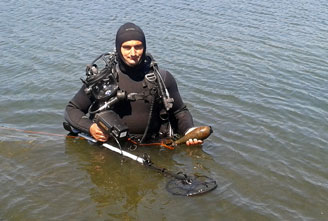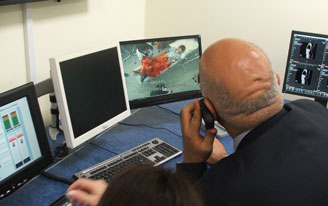NATO boosts cooperation with Ukraine on scientific and security-related activities
Allied and Ukrainian experts gathered in Kyiv on 4 July 2017 to discuss present and future cooperation in the area of emerging security challenges and security-related advanced technologies.

During the meeting of the 15th Joint NATO-Ukraine Working Group on Scientific and Environmental Cooperation, participants exchanged views regarding several Science for Peace and Security (SPS) projects. These projects address a wide variety of emerging security challenges such as counter-terrorism, cyber defence, and the detection and clearance of mines and unexploded ordnance, with the aim of forging networks, supporting capacity-building and helping the country to deal with the negative effects of the Russia-Ukraine crisis.

“Since 2014, Ukraine has been the largest beneficiary of the SPS Programme,” said Ambassador Sorin Ducaru, NATO’s Assistant Secretary General for Emerging Security Challenges. “Many of the ongoing activities have brought about tangible results, positively benefitting local populations and helping Ukraine to cope with the results of the ongoing conflict,” stated Ambassador Ducaru in his opening remarks. Dr Strikha, Ukrainian Deputy Minister for Science and Education, underlined the strong impact the crisis has on the scientific community in Ukraine: 17 Ukrainian universities and 10 research institutions of the National Academy of Sciences of Ukraine had to be re-located as a result of the conflict.
Several SPS flagship projects are part of the Comprehensive Assistance Package (CAP) for Ukraine, endorsed at the 2016 NATO Summit in Warsaw. An SPS flagship project is assisting Ukraine in the area of humanitarian demining by enhancing the capacity of the State Emergency Service of Ukraine (SESU) in undertaking demining operations in eastern parts of the country. A multi-year initiative for the development of a 3D mine detector will ensure the sustainability of the activities. Furthermore, field exercises, organised by NATO’s Euro-Atlantic Disaster Response Coordination Centre in Ukraine and Montenegro in 2015 and 2016 respectively, demonstrated the added value of the cooperation between Ukrainian and Allied scientists and experts in disasters and incidents. “With the current crisis in Ukraine, we need to continue to strengthen practical cooperation between NATO and Ukraine.” “The SPS Programme offers a great tool to do so and it demonstrates our commitment to support Ukraine,” underlined Ambassador Ducaru.

Just recently, in March 2017, a fire at the ammunition depot in Balaklia, Kharkiv region destroyed valuable equipment. The SPS Programme rapidly delivered the needed equipment to enable Ukrainian demining teams to successfully clear the territory of Balaklia town and nine settlements in the vicinity. This support forms part of a larger project under the CAP to enhance the capacity of the SESU in undertaking humanitarian demining operations in areas affected by the conflict in Eastern Ukraine. To ensure the sustainability of the demining activities, scientists from Norway and Ukraine launched a new SPS project in 2016 to develop a 3D mine detector, allowing the SESU to conduct faster, cheaper and safer clearance of former conflict zones and help to avoid victims among civilians and the military.
Another SPS flagship project under the CAP has trained Ukrainian paramedics and has developed a multinational telemedicine system for emergency situations in Ukraine. Telemedicine can add tremendous value in the aftermath of disasters and crises by allowing international medical specialists to provide real-time recommendations to first responders at emergency scenes or in combat zones. At the conference, Ambassador Ducaru announced that, in the context of its support for the establishment of national paramedics centres in Ukraine, the SPS Programme will deliver specialist equipment, including patient simulators and manikins, medical training devices as well as multimedia IT equipment permitting practical and interactive training.
